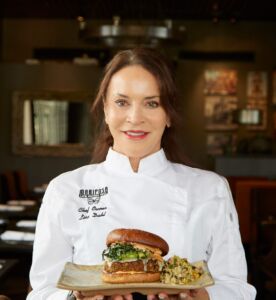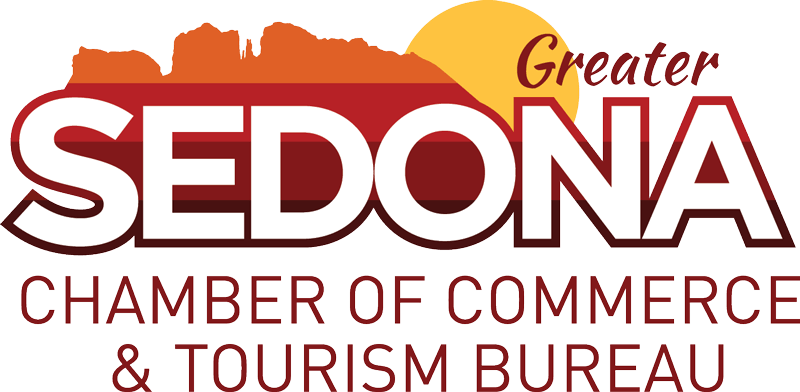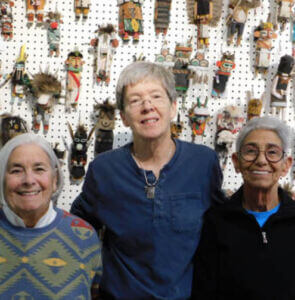Women Who Lead Sedona: Stories of Vision, Creativity, and Heart
Ask most people what drives Sedona's economy and they'll say tourism, energy work, maybe art galleries. They're not wrong. But they're missing who's actually running the show. Walk into the town's most successful restaurants, retail stores, wellness centers, and festivals, and you'll find women at the helm—building businesses that work precisely because they refused to separate profit from purpose.
For women business owners, these stories matter. Not as inspiration porn, but as proof: you can build something meaningful here without compromising your values, your people, or your sanity. Here are the women showing us how.
 Lisa Dahl: Building a Culinary Empire One Plate at a Time
Lisa Dahl: Building a Culinary Empire One Plate at a Time
Before Lisa Dahl became Sedona's most recognized restaurateur, she was a woman turning grief into purpose. Nearly three decades ago, she opened her first restaurant with more determination than capital, channeling personal loss into a mission to feed people—body and soul.
Today, her restaurant collection has put Sedona on the national food map. But ask anyone who's worked for her, and they won't talk about accolades first. They'll tell you about the doors she's opened for women in professional kitchens. About showing up for Chamber initiatives when she could have stayed in her own lane. About mentoring young chefs through their own dark nights.
Dahl's advice to other women entrepreneurs? Stop waiting for the big moment. "Building a legacy is about the decisions you make every Tuesday," she's said. "The ones nobody's watching. The ones that align with who you actually are."
 Kachina House: When Retail Becomes Responsibility
Kachina House: When Retail Becomes Responsibility
The women who run Kachina House—one of Arizona's largest Native American arts distributors—will tell you straight: they're not just moving merchandise. Every kachina doll, every piece of pottery, every strand of turquoise carries a story they're ethically bound to preserve.
Their business model is defiantly old-school. They cultivate decades-long relationships with artists. They answer every tourist's question with the patience of teachers, because they see their store as a classroom. When a visitor reaches for something sacred without understanding its meaning, these women pause the sale and share the context.
It's not the fastest way to ring up transactions. But it's built them something more valuable than quick turnover: trust. With artists, with customers, with the cultures they represent.
For women entrepreneurs tired of growth-hacking and funnels, Kachina House offers a different path: slow down, go deep, and let integrity be your competitive advantage.
 Body Bliss Factory Direct: The Scientists in the Wellness Space
Body Bliss Factory Direct: The Scientists in the Wellness Space
Pam Sculthorp brought something unusual to Sedona's wellness scene: a background in biotech quality systems. While others were making aromatherapy claims based on intuition alone, Sculthorp was running tests and reading research papers.
Together with business partner Jennifer Rivera, she's built Body Bliss into a supplier for high-end destination spas from California to the Caribbean, all while keeping production in Cottonwood and maintaining an immersive retail experience in Uptown Sedona. Their Factory Direct store has become a destination—crystals and custom blends alongside emerging tech like red light therapy.
"I would not be able to do it without Jennifer," Sculthorp said recently, a rare public acknowledgment of what many women business owners know privately: partnership is not weakness. Sometimes the smartest business decision is recognizing you can't—and shouldn't—do it alone.
Their formula? Pair data-driven decision-making with creative intuition. Bring receipts for your wellness claims. Build internal partnerships as carefully as you court external clients.
 ChocolaTree: The Revolutionary Who Grows Her Own Garnish
ChocolaTree: The Revolutionary Who Grows Her Own Garnish
Radhika Jen Marie doesn't run a restaurant. She runs a movement that happens to serve food.
Walk into ChocolaTree Organic Oasis and you're entering her philosophy made physical: entirely organic, largely plant-based, spiritually intentional. She gardens. She forages. She speaks about food as medicine and the earth as partner with the conviction of someone who's spent years practicing what she preaches.
This is not a business plan most consultants would recommend. Fully organic? Gluten-aware? Spiritually oriented in a tourist town where some people just want a burger? But Radhika's unapologetic specificity has become her strength. The people who get it really get it. And they keep coming back—for the food, yes, but also for the gardens, the music, the sense that this space holds something sacred.
For women entrepreneurs afraid their vision is "too niche" or "too weird," ChocolaTree is your permission slip. Double down. The riches are in the niches, especially when you execute with absolute authenticity.
 SpiritFlow Sedona: The Mystic with a Business Plan
SpiritFlow Sedona: The Mystic with a Business Plan
Melina Fuhrmann carries credentials that span worlds: Reiki Master Teacher, Brennan Healing Science practitioner, spiritual counselor, holistic coach. She's worked with clients from dozens of countries, blending what one client described as "the wisdom of an ancient mystic and the dedication of a grounded, highly-educated professional."
That combination—mystical and meticulous—defines her approach. SpiritFlow isn't selling cookie-cutter vortex tours or generic energy work. Every retreat, every session is customized. She checks in after appointments. She supports integration. She's built a practice around depth over volume, quality over scale.
Client testimonials use words like "safe," "ethical," "transformative." These aren't soft skills. They're her competitive advantage.
Fuhrmann's model proves something crucial: empathy and emotional intelligence aren't nice-to-haves. They're core business assets. You can build a sustainable enterprise on presence, care, and personalization—if you're willing to treat "soft" work as serious work.
 Sedona Yoga Festival: Consciousness at Scale
Sedona Yoga Festival: Consciousness at Scale
Heather Shereé Sanders doesn't just organize a yoga festival. She curates a vision of what collective healing could look like, then executes the logistics to make it real.
Under her leadership as co-founder and director, the Sedona Yoga Festival has evolved beyond poses and playlists into something more substantial: trauma-informed practice, social responsibility, unity work. Recent themes have asked practitioners to "hold a vision of a world where peace can prevail"—and then take action to create it.
Behind that vision is serious entrepreneurial infrastructure. Sponsorships. Risk management. Teacher curation. Team leadership. A thousand moving parts that could easily collapse into chaos without clear direction.
Sanders shows how values and logistics aren't opposites. A mission-rooted theme like "being all together, now" becomes the organizing principle for everything—from which teachers to book to how volunteers are trained. Purpose doesn't replace process. Purpose drives process.
What They're Actually Teaching Us
Strip away the red rocks and the wellness branding, and these women are demonstrating principles that work anywhere:
Start with why. Not "what are we selling" but "what are we here to heal, honor, or change." Product follows purpose, not the other way around.
Serve the community that holds you. These businesses create local jobs, collaborate across sectors, and design offerings that strengthen Sedona economically, culturally, and spiritually. Extraction doesn't build legacy.
Adapt without abandoning your core. They pivoted through COVID, supply chain nightmares, and shifting visitor expectations—but none of them sacrificed their foundational values to survive. Flexibility and integrity can coexist.
Lead through relationship. Every story here centers on connection—with staff, partners, clients, artists, guests. Sustainable success is relational, not transactional. Mentorship matters. Partnership matters. Staying personally connected to your customers' journeys matters.
Conclusion: Your Seat at the Table
If you're a woman business owner in Sedona, you're not pioneering alone. Lisa, Pam, Jennifer, Radhika, Melina, Heather, and the Kachina House team have already proven it's possible to align your work with your values—and succeed precisely because of that alignment, not despite it.
Some of them built their businesses from personal healing. Others applied corporate expertise to artisan manufacturing. A few transformed spiritual callings into structured, credible enterprises. Their paths are different, but their message is consistent: in Sedona, leadership isn't just about growth metrics. It's about courage. Specifically, the courage to build something that reflects who you actually are, then invite your community to grow alongside you.
The Sedona Chamber of Commerce exists to support that journey—connecting you with peers who are living proof that women's leadership isn't the future of Sedona's business community. It's the present. And there's room at the table for your story too.

 Kachina House: When Retail Becomes Responsibility
Kachina House: When Retail Becomes Responsibility Body Bliss Factory Direct: The Scientists in the Wellness Space
Body Bliss Factory Direct: The Scientists in the Wellness Space ChocolaTree: The Revolutionary Who Grows Her Own Garnish
ChocolaTree: The Revolutionary Who Grows Her Own Garnish SpiritFlow Sedona: The Mystic with a Business Plan
SpiritFlow Sedona: The Mystic with a Business Plan Sedona Yoga Festival: Consciousness at Scale
Sedona Yoga Festival: Consciousness at Scale